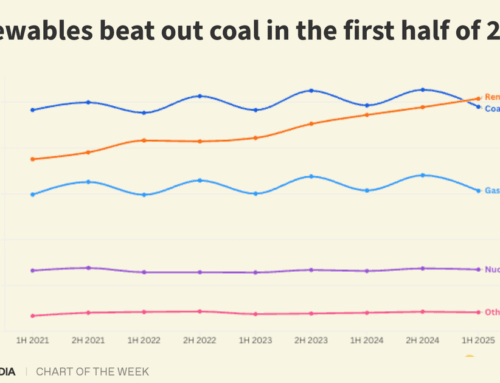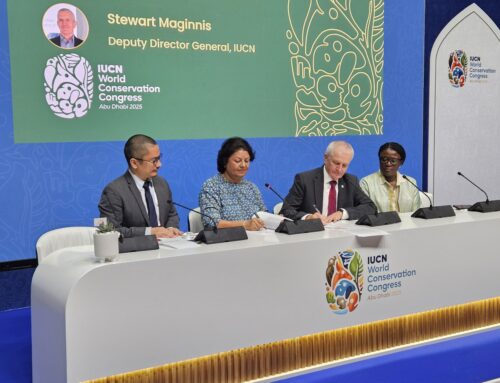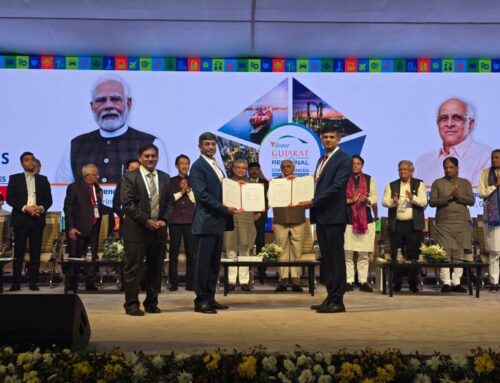Pillars of the Green Transition Live: Execs bet big on clean energy
September 24, 2025
All week, leaders from around the world have convened in New York City for Climate Week amid the United Nations General Assembly meeting. This year also marks the tenth anniversary of the Paris Climate Agreement, an international agreement aimed at lowering greenhouse gas emissions in an effort to curb rising global temperatures.
At the Pillars of the Green Transition event on Wednesday, September 24, 2025, industry leaders will gather at Newsweek’s headquarters at One World Trade Center to discuss investing in sustainable strategies that help meet their climate goals.
- The event begins at 1:30 and will conclude with a networking reception from 5:15 to 6 p.m.
- Panels will focus on energy storage and improved grid resilience, sustainability in food systems and how bioenergy is becoming the cornerstone of decarbonization.
- The conversations will be led by Newsweek‘s Environmental and Sustainability Editor Jeffery Young and Newsweek Senior Reporter Katherine Fung.
- Attendees are expected from companies such as Bayer, Samsung, Whole Foods, Nasdaq and Volkswagen.
- The event is sponsored by Arva, Daikin, EcoEngineers, Elopak, LF Bioenergy, Sevana Bioenergy and Wärtsilä.
- The conference will also be livestreamed here. It will also stream live on LinkedIn.
- The full schedule and list of speakers can be found at the event page, here.

Pillars of the Green Transition Title Card
Pillars of the Green Transition Title Card
Newsweek
Follow Newsweek’s live blog for the latest updates.
03:37 PM EDT
Networking break begins
Attendees are now enjoying a 20-minute break to get refreshments and network before the next panel begins at 3:50 p.m.
03:32 PM EDT
There is ‘enormous’ potential for batteries to reduce emissions, panelist says
When asked about the potential for the emissions reduction gains from battery energy storage, Eric Trusiewicz of Rondo Energy said there is “enormous” potential.
If we can electrify industrial processes that normally are combustible on site through some kind of a very low-cost battery life, he said, there will be a slash in emissions. The role of his company, he said, is to keep up with those advancements.
Eva Gardow said energy storage is “only as smart as we make it.” It’s less about the system itself and more about how it is used and integrated into the larger energy system. How you control and operate the batteries will determine it’s impacts.
“Storage systems can provide values at a location, but to impact the emission profile, it’s [about] how do you coordinate it across the grid,” she said.
03:29 PM EDT
Panelist says going green “is not black and white”
Håkan Agnevall said “green is not black and white,” meaning there is not just one solution and storage is just one option to achieve a sustainable future.
There is the base load storage needed for things like data centers, but also the balance needed for the introduction of more renewables to remain stable.
“We need to mix the traditional base load and the balance,” he said. “There is no one single way, I think that is the key message. Power systems are becoming more complex [as] we are coming from big, centralized, huge CCTV power plants, and going to more decentralized generation.”
03:14 PM EDT
Panel talks solutions to energy demand spike
Newsweek’s Jeff Young noted that there has been a spike in energy demand, and it’s only growing.
Evan van Hook said there will be a 70 percent increase in energy demand by 2050, but “what’s even more scary,” he said, is there will be a more than 50 percent increase in peak demand by 2050
“The demand we are barely able to manage now will get more difficult to handle,” he said.
As demand is increasing, Eva Gardow of EPRI said the fundamental concern will be control of that demand. This includes the technology, markets and distribution. One solution she noted is putting mobile energy storage systems at rest stops along the New York State Thruway to support EV charging stations.
03:06 PM EDT
Panelists said batteries can reduce costs, carbon footprint
Evan van Hook of Viridi said batteries play a huge role in decarbonization.
“Batteries allow tremendous support for the grid by providing a lot of different ways of relief valves for when there’s congestion, to tighten the grid and provide resilience when there’s failure to the grid,” he said. “So batteries to the rescue. Because of those failures of the grid, people are taking more control of themselves [to ensure] clean and reliable generation.”
He also said batteries can “significantly” reduce costs and generate revenue,
02:58 PM EDT
Wartsila CEO says energy storage is a “game changer”
Håkan Agnevall said storage “is a game-changer” because it creates opportunities to build on power systems in a different way.
“It’s not the holy grail that will solve all our problems in power systems, but we’ve got new, important tools to build and strengthen the resiliency of our power systems and also prepare our power systems for the future, we will have more power generation from intermittent sources, like renewables.”
02:53 PM EDT
First panel talks energy storage, grid resilience
Newsweek’s Jeff Young stays on stage to moderate the first panel of the conference.
“Expanding Possibilities with Energy Storage” will explore how grid-scale batteries and other energy storage solutions are transforming the energy landscape to a zero-carbon future.
The panelists include Håkan Agnevall, president and CEO of Wärtsilä , a world leader in decarbonization of marine and energy industries; Eva Gardow, a program manager at the Electric Power Research Institute (EPRI), a nonprofit that researches the generation, delivery and use of electricity/ an energy research and development nonprofit; Evan van Hook, the chief sustainability officer at Viridi, an energy storage distributor using lithium-ion technology; and Eric Trusiewicz, the CEO of Rondo Energy, which provides zero-carbon batteries in the industrial heat industry.
Panelists will discuss how storage solutions provide better use of renewable energy sources and improve grid resilience and explain the latest technology and potential application of energy storage to grow power while cutting emissions.
Our energy landscape is rapidly evolving with the advent of new means to store energy. Panelists from Wartsila, EPRI, Virdi, and Rondo Energy discuss the latest advancements in energy storage technology.
Our live blog: https://t.co/GyVYSsZnXN pic.twitter.com/2SFTBEYG9F
— Newsweek (@Newsweek)
02:48 PM EDT
Daikin exec says efficiency standards and incentive programs are essential
When asked about the policy solutions to help meet sustainability goals, Calabrese said efficiency standards and incentive programs are two great places to start.
“Sometimes you can get brand new systems zero cost through the utility [company] and utility benefits, because they get a product that they can then help them manage their load,” he said.
It’s not just one thing, Calabrese added, it’s a combination of policies and the right combination of requirements that will push the needle. He said Energy Star products are voluntary programs that incentivize consumers to purchase energy-efficient products that drive the market.
“The sky’s the limit, but again, it’s this perfect storm of government working with the industry and getting the market to move in a direction that is beneficial to all,” he said.
02:44 PM EDT
Daikin shares technology goals in HVAC industry
Newsweek’s Jeff Young said 700 additional terawatt hours of electricity will be needed by the end of this decade just to meet the need for the growth in air conditioning globally.
Calabrese said 20 percent or more of energy use is from heating, ventilation and air conditioning.
“If not designed properly, if we do not take into account comfort and efficiency, you have a building that is out of whack,” he said, with very hot and very cold spots in the same building.
He added that the increased use of AI and electric vehicles being plugged into the energy grid is flattening the duck curve of utility use and pushing utility usage to higher levels.
If you don’t properly plan for energy use, he said, you will have incidents like power grid failure a few years ago in Texas, when the grid couldn’t handle demand during a cold winter, leading to blackouts and rate spikes for residents.
Calabrese said Daikin has three main technology goals. The first is to expand the use of heat pumps globally, especially in North America.
“We’d like to see that expand and when you add clean energy from utilities, you have the perfect storm of energy conservation,” he said.
The company’s other goals include improved inverter and refrigerant technology.
Refrigerants are “the lifeblood” of a building unit, Calabrese said, but it also has a high greenhouse gas potential. So the company is aiming to lower the global warming potential of those refrigerants.
02:32 PM EDT
First fireside chat begins with Daikin executive
The first conversation of the day is a fireside chat between Newsweek’s Environment and Sustainability Editor Jeff Young and Dave Calabrese, executive vice president at Daikin.
Japan-based Daikin Industries is the world’s largest air conditioning manufacturer.
Today’s Fireside Chat is “Building a Sustainable Future” with Dave Calabrese, Senior Executive at Daikin, joined by Newsweek’s Jeff Young to discuss the role of technology and innovation in decarbonization and sustainability.
Our live blog: https://t.co/eoOOld3CYu pic.twitter.com/xbMpwz1Pju
— Newsweek (@Newsweek)
02:27 PM EDT
Poll results show “pessimistic” view of climate goals
Brian McGovern shared polling results among the attendees in person and those joining virtually.
These were some of the results:
- When asked about when their company aims to meet net zero emissions goals, most respondents said they had “no formal target.”
- When asked who holds the power to move the needle in climate progress, most people said the government, followed by corporations.
- When asked if they believe the net-zero roadmaps published are realistic, most respondents said no.
- Which trends expect to dominate in the next 12 months, a slim majority said AI for ESG reporting, followed by climate litigation
Finally, when asked to choose one word to describe the state of corporate climate leadership, McGovern said the response was “somewhat pessimistic.”
McGovern said he’s hoping the conversations in the room will provide actual work cases and progress to address these areas.
02:19 PM EDT
Newsweek Editor-in-Chief welcomes attendees
Newsweek’s Editor-in-Chief Jennifer Cunningham welcomed attendees and thanked the event sponsors at the Pillars of the Green Transition conference at Newsweek’s office in One World Trade Center.
The conference brings together climate action leaders from around the world to discuss the strategies and success stories driving the global transition to renewable energy.
01:55 PM EDT
Catch up on Newsweek’s climate coverage
Catch up on some of Newsweek’s latest climate coverage ahead of today’s event.
01:47 PM EDT
Pillars of the Green Transition to kick off soon
Newsweek’s Pillars of the Green Transition conference will kick off at 2:15.
Guests are beginning to arrive at Newsweek’s New York City headquarters.
The programming includes discussions about energy storage, food systems and bioenergy with experts leading the movement towards renewable energy.
Here is a preview of today’s lineup:
2:30 – Fireside chat with Dave Calabrese, Senior Executive at Daikin
2:50 – Panel 1: Expanding Possibilities with Energy Storage
- Håkan Agnevall, President & Chief Executive Officer, Wartsila
- Eva Gardow, Program Manager, EPRI
- Evan van Hook, Chief Sustainability Officer, Viridi
- Eric Trusiewicz, CEO, Rondo Energy
3:50 – Panel 2: Growing Climate Solutions in Food Systems
- Phil Harris, CRO, Arva
- Thomas Körmendi, Chief Executive Officer, Elopak
- Helen Clarkson, CEO, Climate Group
- Alex Gillett, CEO, HowGood
4:30 – Panel 3: Turning Emissions into Energy: Bioenergy at the Core of the Green Transition
- Brent Lilienthal, CEO, LF Bioenergy
- Steve Compton, CEO, Sevana Bioenergy
- Brad Pleima, President, EcoEngineers
The link to the livestream can be found here.
Search
RECENT PRESS RELEASES
Related Post




